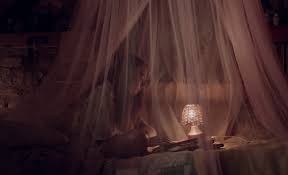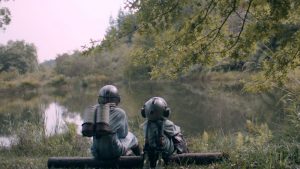QUICK SNAP: LIVE FROM TALLINN
Svetka (Svetlana Yancheka) is rugged, raspy-voiced and blunt widow around 50 years of age. She lives in a pauper yet fully functional wooden house on the Bulgarian coast. Her interactions with neighbours are limited to the little occasional banter. She spends long stretches of time in the cemetery with her husband. One day, she comes across a “negro” in the woods. She is scared of the unusual alien. He explains in English that he’s a Mali refugee, bit Svetka only speaks Bulgarian. Their verbal communication is extremely limited.
Svetka locks the stranger in her shed and seeks advice from the mayor, who suggests that she ties him to a tree and hands him to border force the next day. Gradually, the calm and polite black man breaks the ice. He’s called Bamba and he lost his wife and children in a war. He fled in order to avoid almost certain execution. Svetka buys an English dictionary and Bamba begins to learn a few words in Bulgarian. A gentle romance is beginning to blossom.
The rest of the community is less enamoured of Bamba. They feel threatened by his mere presence. They assume that the African is insulting and conspiring against them. In reality, the locals are the hostile ones. One neighbour does eventually grow fond of Bamba after the foreigner – who turns out to be a doctor – helps to treat his fever. This plot has similarities to Fassbinder’s Fear Eats the Soul (1974), but there is also a very significant difference. In the German film, an old woman marries an African immigrant, and her community refuses to accept him. They eventually embrace him as they realise that the immigrant could be useful. In Fear, the community – bar this one neighbour – is intrinsically racist and xenophobic. They reject integration, instead demanding a succinct “Bulgaria for Bulgarians”. They even resort to extreme intimidation measures, including breaking window, graffiti and violence.
Despite its interesting premise, Fear doesn’t work as a comedy. The jokes are preposterous and puerile: a child announces to a group of refugees that “there is shit in the bathroom, but it’s from the heart”; Bamba jumps and wails after eating a spicy pepper, prompting neighbours to think that he’s being violent. The stern black and white photography clashes with ostensibly humorous tone of the story. It doesn’t work as a drama, either. The romance between Svetka and Bamba isn’t fully explored. There is not a single kiss, and the sexual interaction is but a vague suggestion. As a result, this Bulgarian movie elicits little laughter and little emotion.
Another problem is that the Bamba character never becomes fully fledged. He embodies kindness and education, but that’s about it. He never challenges the confronts the rabid prejudice and the threats to which he is subjected. Further characters and narrative devices are disjointed. There is a local band, an unscrupulous politician, a lenient border force. I’m not entirely sure of the function they perform. Drone establishing shots capture the ruins of an abandoned seafront resort. It just doesn’t gel together.
Fear has just premiered at the Tallinn Black Nights Film Festival. It is in the event’s Official Competition.










